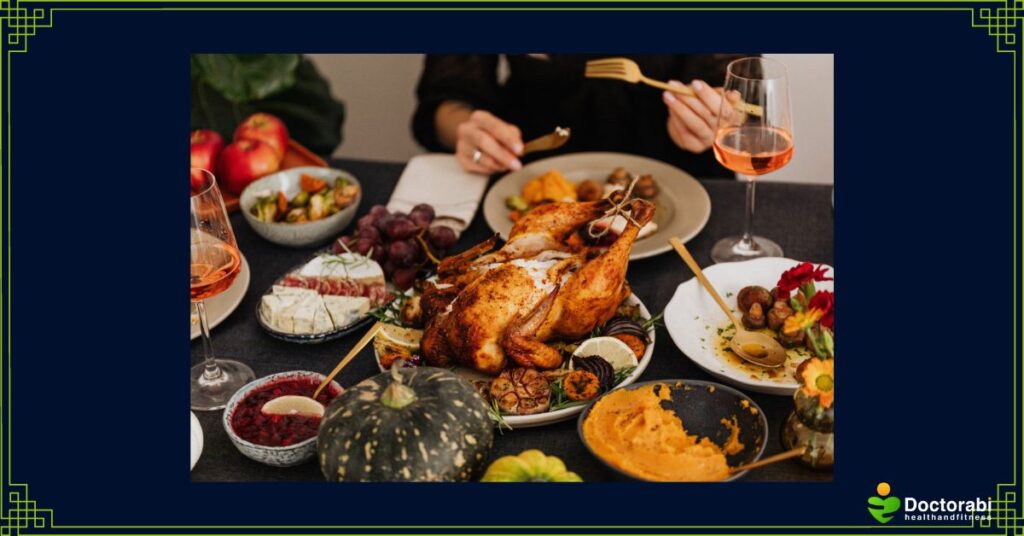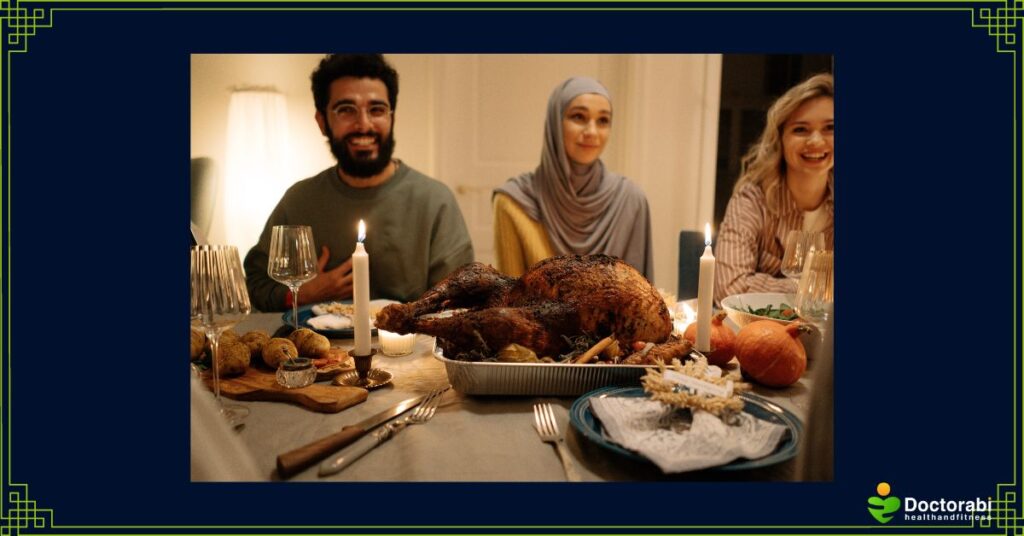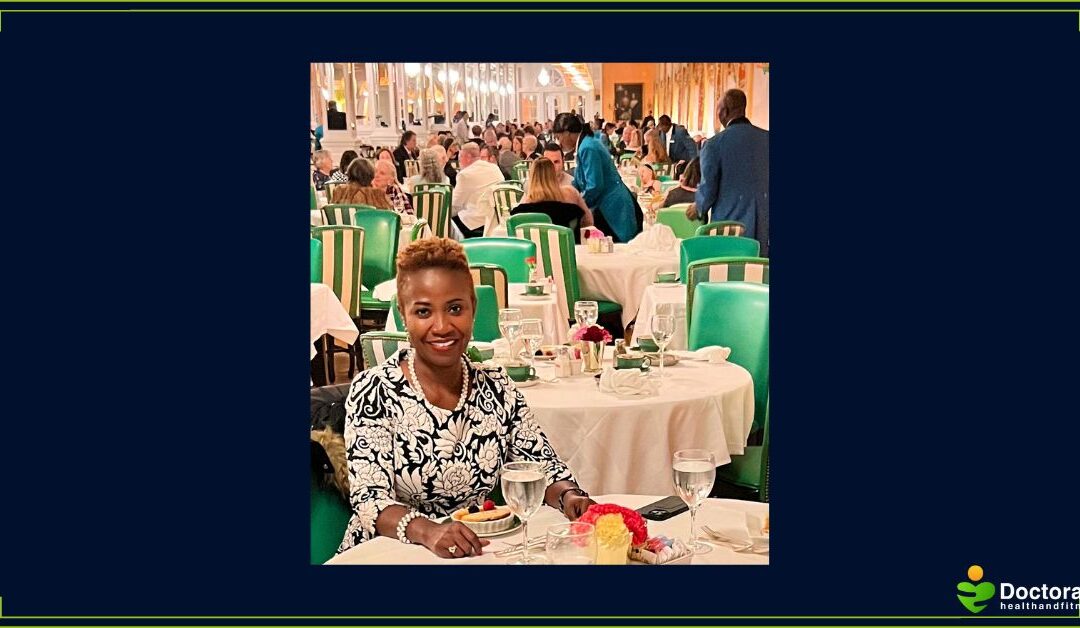Thanksgiving is around the corner, and the hustle and bustle to create the perfect Thanksgiving feast has begun. According to a report, the average American may consume more than 4,500 calories and 229 grams of fat during Thanksgiving! If you have been practicing a healthy lifestyle, you may be anxious about how Thanksgiving dinner may take you a step backward. So, is it possible to literarily eat our cake and have it? These 7 tips for enjoying Thanksgiving dinner without worrying about calories may be the perfect answer.

Yes, the internet is bursting with advice on how to eat healthy during Thanksgiving. You can cook with less sugar and less fat, drink a lot of water before eating, practice portion control, and eat more greens. And these are all great advice. But as for me, I want to enjoy my Thanksgiving dinner. I want to savor every flavor without overthinking the extra calories because this is a once-in-a-year event. Today, I would like to take our focus away from the number of calories consumed during Thanksgiving. Instead, let’s focus on giving thanks and enjoying our Thanksgiving feast. Before I share these 7 tips to enjoy Thanksgiving dinner without worrying about calories, let’s see why the Thanksgiving feast is so important.
Why is the Thanksgiving feast important?

Feasting is when we come together to celebrate with food. Every culture engages in feasts to celebrate significant landmarks, including weddings and anniversaries. In fact, feasting is so fundamental to our human existence that God calls for at least seven feasts in the Bible.
We must realize that feasting can improve our overall health and weight loss. Feasting promotes social bonding and camaraderie. Gathering together for a feast is great for our social and emotional well-being and overall health. Research shows that people who often eat with others are happier, have larger social networks, and are more satisfied with their lives.
Also, feasting can help boost your metabolism, especially when your metabolism has slowed down due to a restrictive diet. An over-intake of food causes a release of the hormone leptin. Leptin helps to control your appetite and regulate your energy balance, so you don’t experience unnecessary hunger. When Leptin increases, another hormone, ghrelin, decreases. Ghrelin signals to your brain that you are hungry, so lower levels mean you will probably eat less.
So now that we know that feasting can promote our health and well-being, Let’s review these 7 Tips for enjoying Thanksgiving dinner without worrying about calories.

7 Tips for enjoying Thanksgiving dinner without worrying about calories
1) Focus on giving thanks
The Thanksgiving dinner or feast is about celebrating with food. Giving thanks and sharing this feast acknowledges God’s abundance and provision.
Then Jesus took the loaves, gave thanks to God, and distributed them to the people. Afterward, he did the same with the fish. And they all ate as much as they wanted. (John 6: 11, NLT).
The very act of giving thanks is excellent for our mental health and well-being. Giving thanks is powerful, purposeful, and rejuvenating. And what better time to give thanks than Thanksgiving? So, start by thanking God, then eat as much as you want.
2) Exercise

Now is not the time to abandon your fitness routine amid all the hustle and bustle of the Holidays. In fact, now is the time to exercise a little more so you can create a caloric deficit and eat without guilt during Thanksgiving. These last few weeks before Thanksgiving, walk an extra mile daily or dance a little longer. And in addition to being ready for Thanksgiving dinner, you will reap all the other numerous benefits of exercise. If you are not an exerciser, check out these 10 mind hacks to start exercising.
3) Set realistic goals
Be realistic about your goals and set yourself up for success. We all know that there is food everywhere you turn during the Holiday season. Making your goal weight maintenance instead of weight loss sets you up to achieve success and avoid frustration.
4) Practice gratitude

Even before Thanksgiving, get into the habit of practicing gratitude daily. Practicing gratitude will help you refocus on what you have instead of what you lack. Be grateful for the abundance of food, family, and friends. Practicing gratitude will uplift your spirits, help you get along well with others, and reduce your stress and anxiety about Thanksgiving. The health and well-being benefits of practicing gratitude are numerous. For more on why you should adopt a heart of gratitude and how to practice gratitude, check out “Thankful for the Little Things.”
5) Celebrate

Celebrate your relationships with your family and friends. Change your focus from yourself to your family and friends. Focus more on socializing and spending quality time together rather than the fear of consuming too many calories.
6) Sleep well
Now is the time to start going to bed earlier. Aim for a minimum of 7 hours of quality sleep each night. Studies show that sleep affects the hormones that control appetite. People who don’t sleep well have a bigger appetite, tend to eat more, and are more attracted to foods high in calories, carbohydrates, and fat. People who get adequate sleep tend to eat fewer calories than those who don’t sleep enough. So, if you sleep well now, you are less likely to overeat during Thanksgiving.

7) Plan for after-Thanksgiving
Feasts are not an everyday affair. How will you resume your healthy eating after Thanksgiving? What will you do with the leftovers? Can you create healthy meals from the leftovers? Also, plan to exercise a little more after Thanksgiving so you can burn off any excess calories.
Final thoughts

So I commend the enjoyment of life, because there is nothing better for a person under the sun than to eat and drink and be glad. Then joy will accompany them in their toil all the days of the life God has given them under the sun. (Ecclesiastes 8:15, NIV).
The joy we experience during the Thanksgiving feast helps us deal with our everyday stresses.
Every Thanksgiving, I am privileged to host my family and friends for dinner. As I put together my menu, I admit that nothing here is low-calorie or low-fat. For this one day, I am making all my recipes in their original glory. I plan to relax and enjoy being with friends and family for one delicious feast. Instead of spending my mental energy on reducing calories, I choose to thank God for the opportunity to spend time with family and friends. I opt to thank God for good health and the ability to eat and enjoy God’s abundance and provision.
So, this Thanksgiving, let’s not be too preoccupied with how much we eat. Worrying too much about the calories we consume can rob our hearts of gratitude. For this one day, let’s practice thanksgiving and not worry so much about our weight and bellies.
Don’t get me wrong. I am not encouraging you to go home and overeat daily. Instead, I am asking that you ditch the guilt associated with Thanksgiving dinner. For this one day, rather than focusing on the fat content of your meal, celebrate Thanksgiving for what it is – a time to be grateful.
Finally, will you be counting your calories or blessings this Thanksgiving? Or both? Please feel free to share your comments below. Also, please feel free to share this article.
Yours in health and fitness,
Doctor Abi

